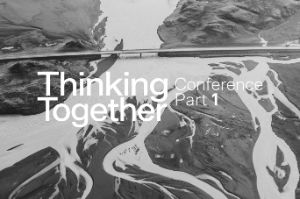Conference | Thinking Together
Circluding History I

River delta in Island © iStock.com / Oleh Slobodeniuk
Nicht nur die Frage, wie Zeitkonzeptionen unsere Auffassung von Geschichte leiten, ist Gegenstand der Konferenz von Thinking Together. Vor allem werden andere, nicht-lineare Modelle Geschichte zu denken zur Diskussion gestellt.
Thinking Together 2019 looks at history and historiography through a politically focused lens of time. In its fifth year of investigation, the Thinking Together Conference scrutinizes common and dogged conceptions of linear time and history in order to disclose their underlying political matrices. What are the variegated politics behind historically contingent philosophies of history? What conceptions of time are they based on? And how do they, in turn, influence views onto the present, the ways of relating to the past and the ability to shape the future? The title of the conference, “Circluding History”, hints at a different way to approach history. “Circlusion” (a term coined by Bini Adamczak) is the antonym of penetration. It suggests non-linear understandings, inverts the relation between activity and passivity, and calls for a symmetrical distribution of agencies. Following its speculative trajectories, this conference will investigate and (re)imagine relations to the past, present and future, alternative genealogies, decolonized, global, connected as well as queer histories.
Dag Herbjørnsrud
Fake history, distorted world-views: How ideology shapes what we (think we) know.
What do we know? And how do we know it? – In this presentation, Dag Herbjørnsrud, specialised in global history of ideas, will make a tour de force through some of the most vital parts of our knowledge systems within history and the humanities. The presented material – text, pictures, and music – will cover, among other things: Our distorted world maps; music by Mozart, Haydn, and their contemporary Joseph Bologne; colourful statues and buildings of the ancient Greeks;the creation of the first philosophy (in Egypt); women thinkers of antiquity from India, China, Syria, Nigeria, and Mexico; the influence of the Egyptian Saint Maurice, the Moritzkirche, and African Christianity on Central Europe; the untold story of Muslim-Christian cooperation at the Battle of Vienna in 1683; the importance of the pre-Kant African scholars Abba Gorgoryos and Anton Wilhelm Amo for Germany; the Enlightenment of the Haitian Revolution; the relationship between Zhuangzi and Buber/Heidegger; the latest research on the original writing and communication systems of the Maya, Aztec, and Inka cultures; the hidden stories of the Vikings, the stave church in Heddal (Telemark), and the Sami people in the Nordic countries,. and then some more.
Dag Herbjørnsrud’s presentation will try to open our minds for a new, decolonised, and non-Eurocentric take on history – in order to make us better understand the present and be prepared for the future in a global 21st century.
For more information: www.sgoki.org/no/english/
__________
Anke Charton
Making History Great Again: Performing Narratives of Nostalgia
How do conceptualisations of history partake in a Now that increasingly calls upon nostalgia to constitute subjectivities? If enacting the yearning for a past ‘golden age’ becomes the decisive pattern of presence past – as an affective authenticity – then prior realities become fictions: the memory of something that never was.
Thinking the past as an imagination of the present opens up a space to consider multifold histories: history fragments into stories, inviting non-linear, fragmented and marginalized perspectives as parts of the kaleidoscope.
Yet if the memory of something that never was threatens to cover up a factual past and is instrumentalised as a tool of oppression, questions of ethos and truth must be considered foremost – if history is a practice that constitutes our realities as enacted narratives, how do we ’do’ history responsibly?
__________
Rolando Vázquez
Time and the Coloniality of History
There is a strong kinship between contemporaneity and history. They are both expressions of the temporality of modernity, of modernity’s metaphysics of presence and the forgetfulness of time. History has functioned in modernity as a way of mediating and governing our relation to the past. It became an epistemic and most often textual representation of the past. The relation to lived memories came to be replaced by the mediation of a past understood as the object of history. The decolonial critique of modern time contests the harnessing of the relations with what has been lived to the technologies of presence.
Decoloniality is concerned with a justice that cannot be reduced to the present, nor speculated as simple futurity. The justice of decoloniality implies a process of healing the colonial wound. The temporality of the wound, the temporality of healing is a deep relational temporality. It is carried by the bodies, the land, and the sea that cannot forget. Decoloniality is a struggle against the oblivion imposed by modernity’s notions of history and contemporaneity.
Below the surface of appearance, the surface of presence that modernity affirms as the totality of the real, there is the radical plurality of lived time. There is a time that precedes us, in that it is before and before us – both in front and prior to –, that carries hope. Precedence names a temporal mode of wording the world that moves against the forgetfulness of who we are as earth, as peoples, as time.
Programme
14:00 – 15:00
The Politics of Time
Timothy Morton (USA)in conversation with Berno Odo Polzer
15:00 – 16:00
Fake history, distorted world-views: How ideology shapes what we (think we) know.
With Dag Herbjørnsrud (NO)
16:00 – 17:00
Making History Great Again: Performing Narratives of Nostalgia
With Anke Charton (AT)
17:00 – 18:00
Time and the Coloniality of History
With Rolando Vázquez (MX/NL)